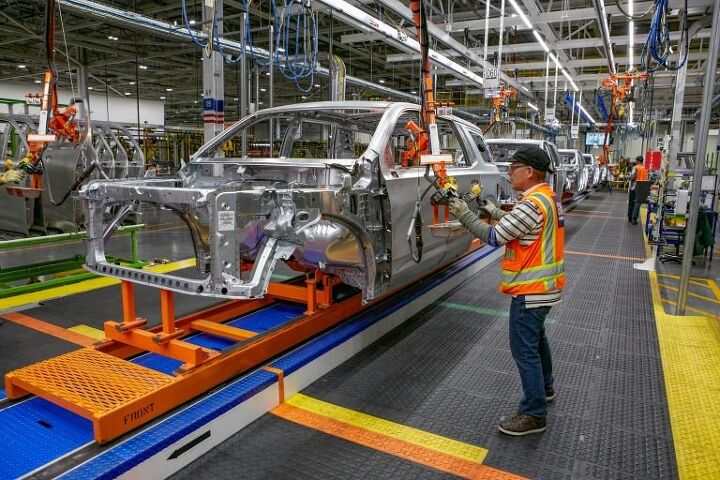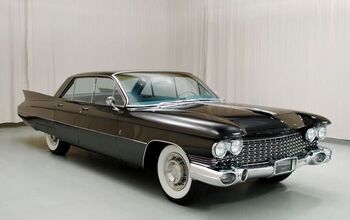GM Halts Production at Nearly All U.S. Plants, Chip Shortage to Blame

The chip shortage has struck again.
General Motors is going to temporarily halt production at most of its North American assembly plants, starting Monday, because the shortage of semiconductor chips continues.
Arlington Assembly in Texas, which makes full-size SUVs, will continue to run regular production next week. As will Flint Assembly in Michigan, which is where the company builds heavy-duty pickup trucks. Bowling Green Assembly in Kentucky, home of the Chevrolet Corvette, will also continue to work. Finally, Lansing Grand River Assembly in Michigan will have partial production. Some Chevy Camaros and Cadillac Blackwings are built there.
The rest of the company’s plants in North America will go idle on Monday.
“All the announcements we made today are related to the chips shortage, the only plant down that’s not related to that, is Orion Assembly,” GM spokesman Dan Flores told The Detroit Free Press.
All because of the chip shortage. Except for Orion Assembly, which is already shut down due to Chevrolet Bolt recall issues.
Semiconductor chips are used in a plethora of different automotive parts, and there’s been a shortage during the pandemic as demand for personal electronics rose and as production issues, like fires, occurred.
Workers being out sick with COVID and/or COVID-related restrictions can also cause problems with semiconductor-chip production.
“COVID is driving supply constraints in countries that produce semiconductor chips,” Flores told the Freep. “But I can’t say if it’s because employees have a high rate of infection or if it’s the government putting restrictions on plants due to the pandemic.”
This forces automakers to either halt production or build cars without the chips. In the latter scenario, cars are held until the chips can be installed before finally being shipped to dealers.
The shortage has kept new-car inventories tight, thus leading to higher prices for both new and used vehicles.
Some GM plants will remain active on some level, even if production grinds to a halt. The Freep points to Fort Wayne Assembly and Mexico’s Silao Assembly, both of which build light-duty trucks, as examples.
“During the downtime, we will repair and ship unfinished vehicles from many impacted plants, including Fort Wayne and Silao, to dealers to help meet the strong customer demand for our products,” Flores told the paper. “Although the situation remains complex and very fluid, we remain confident in our team’s ability to continue finding creative solutions to minimize the impact on our highest-demand and capacity-constrained vehicles.”
He added: “What we announced this morning is what we know now. I can’t speculate if something will be announced next week or if there’ll be additional impacts. We manage this on a day-to-day basis.”
The Free Press has a full list of affected changes at its site.
[Image: GM]

Tim Healey grew up around the auto-parts business and has always had a love for cars — his parents joke his first word was “‘Vette”. Despite this, he wanted to pursue a career in sports writing but he ended up falling semi-accidentally into the automotive-journalism industry, first at Consumer Guide Automotive and later at Web2Carz.com. He also worked as an industry analyst at Mintel Group and freelanced for About.com, CarFax, Vehix.com, High Gear Media, Torque News, FutureCar.com, Cars.com, among others, and of course Vertical Scope sites such as AutoGuide.com, Off-Road.com, and HybridCars.com. He’s an urbanite and as such, doesn’t need a daily driver, but if he had one, it would be compact, sporty, and have a manual transmission.
More by Tim Healey
Latest Car Reviews
Read moreLatest Product Reviews
Read moreRecent Comments
- E I get that TTAC has a strong anti EV bias but this article is quite a reach. For GM and Ford to pressure their suppliers to cut costs is business as usual. It would be bigger news if they told suppliers not to worry about costs and to keep raising prices on parts.
- Master Baiter Consumers should have the right to purchase products from other countries if they are better or cheaper than domestic alternatives. However, retaining the capacity to manufacture goods is also in the national interest. I don't have the answer.
- Tom Frank …hit up a Ford or Lincoln dealer to have the vehicle software updated to the latest version…But isn’t the latest version the reason for the recall? I’d like last month’s software, please. That version worked.
- Pig_Iron Many, many moons ago in in my macro economics class, they preached to us from upon high that "free trade" is the only way to go. Period. End of discussion. So free trade spread across North America and deindustrialization swept the land. Employment in good paying jobs with saving wages, health benefits, and decent pensions evaporated in the rush to offshore. But not to worry they said, the "knowledge economy" would replace it. But the knowledge proved even easier to offshore. Don't worry they said we are now a "service economy". But those jobs turned out to be little more than wage slavery. But don't worry they said. there's actually a labor shortage, so we'll throw the borders wide open to undocumented fighting age male migrants and turn a blind eye to others exploited in the process. And on top of all that, China has declared "unrestricted warfare" on us. So, you ask me if protectionism is a valid strategy to combat a flood of products on a markedly tilted playing field? Three guesses, first two don't count. ✌
- THX1136 I don't view Chinese products as being all that much better. For me they are the new 'made in Japan' which, when I was a kid, was an indicator of poor quality, not exceptional as they became. Case in point, look at the cheap (meaning poorly made) items that make up over 60% (conservatively) of what's on the shelf at retailers such as Wally World. I would agree allowing them in without much todo would in theory push others to do better. I feel that is only sometimes the case. AND, it's an election year so there is tons o'posturing on both sides.

































Comments
Join the conversation
Arlington and Flint - I wonder why they prioritized those plants? Background: When I worked for old GM around the turn of the century, I was once given access to the Double Secret profit figures by carline. At the time, you could have eliminated 20% of GM's vehicle offerings and profit would have increased (significantly). [You could have kept going, but we will keep this PG rated.] TL;DR: GM is managed better now than it was two decades ago. (The careful reader will note that Fort Wayne and Silao will also be shipping vehicles.)
GM has lost of its market share especially when Toyota is outselling GM in the US. Eventually GM will become a take over target and that might be what Mary Barra is planning to downsize GM to make them more profitable and look for another car company to merge with. Making GM more profitable will make it more attractive for a potential takeover. My parents and grandparents were and I have been a loyal GM customer for a century (me for 46 years) but I don't like most of GMs current products and their reliability has steadily gone downhill. Ford has some products that I like but they have quality issues as well and Stellantis I won't bother with. I have been overall satisfied with the Hondas that I have owned and would buy another Honda along with Toyota and Mazda.